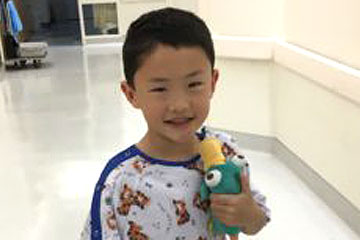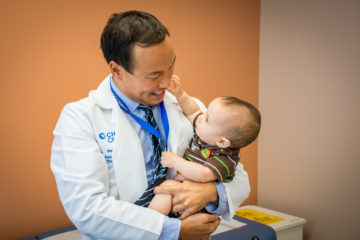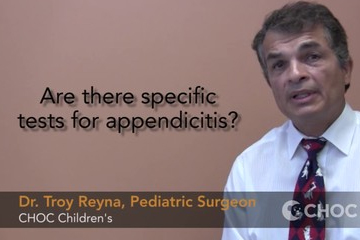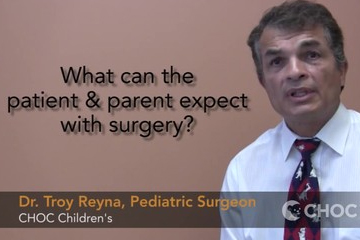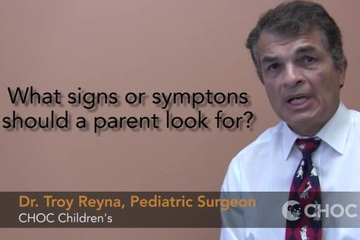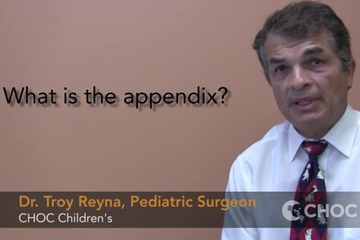What causes appendicitis?
Appendicitis happens when the inside of the appendix is blocked by something, causing swelling and infection. It can also occur because of stool, parasites, or viral inflammation.
The appendix then becomes inflamed and swollen. This is because the germs (bacteria) in the appendix begin to increase quickly. As the swelling and soreness get worse, the blood supply to the appendix is cut off.
All parts of the body need the right amount of blood flow to stay healthy. When blood flow is reduced, the appendix starts to die. The appendix will burst or rupture as its walls start to get holes. These holes let stool, mucus and other substances leak through and get inside the belly or abdomen. A serious infection called peritonitis may occur in the belly when the appendix bursts. If not treated, it can be fatal.
What are the symptoms of appendicitis?
Each child’s symptoms may vary. Below are some common symptoms of appendicitis.
Pain in the belly (abdomen) is the most common symptom. This pain:
- May start in the area around the belly button, and move to the lower right-hand side of the belly. Or it may start in the lower right-hand side of the belly.
- Often gets worse as time passes
- May be worse when the child is moving, taking deep breaths, being touched, or coughing and sneezing
- May be felt all over the belly if the appendix bursts.
Other common symptoms include:
- Upset stomach (nausea) and vomiting
- Loss of appetite
- Fever and chills
- Changes in behavior
- Trouble having a bowel movement (constipation)
- Loose stool (diarrhea)
- Swollen belly in younger children.
How is appendicitis diagnosed?
Your child’s doctor will take a health history and do a physical exam. The doctor may also order tests, including:
- Abdominal ultrasound. This imaging test uses high-frequency sound waves and a computer to create images of blood vessels, tissues and organs. It is used to see internal organs as they work. Learn more about having an ultrasound at CHOC.
- CT scan. This imaging test uses both X-rays and computer technology to show detailed images of any part of the body. This includes the bones, muscles, fat and organs. It is more detailed than a general X-ray. Learn more about having a CT scan at CHOC.
Other tests may include:
- Blood tests. These tests check the infection. They can also see if there are any problems with other abdominal organs, such as the liver or pancreas. Learn more about having a blood test at CHOC.
- Urine test. This test can tell if there is a bladder or kidney infection, which may have some of the same symptoms as appendicitis.
Symptoms of appendicitis may look like other health problems. Always see your child’s health care provider for a diagnosis.
How is appendicitis treated?
Treatment will depend on your child’s symptoms, age and general health. Appendicitis is a medical emergency. It is likely the appendix will burst and cause a serious, deadly infection. For this reason, your child’s doctor will likely advise that your child have surgery to remove the appendix.
In most cases, the appendix is removed using laparoscopic surgery. Your child is given anesthesia by our pediatric anesthesiologists. This method uses a few small incisions and a camera called a laparoscope to look inside the belly. The surgical tools are placed through one or more small incisions. The laparoscope is put in through another incision.
Sometimes the appendix bursts, and a collection of infected fluid or pus (abscess) may form. If this happens and your child is stable, the provider may recommend not removing the appendix right away. Instead, the provider may want to treat the infection first and drain the infected fluid from the abscess. The appendix will be removed later. This delayed surgery is called an interval appendectomy.
For an interval appendectomy, your child may first have IV antibiotics. These are given through an IV tube called a PICC line, or a peripherally inserted central catheter. This is done for about 10 to 14 days. In addition, the provider may use CT or ultrasound-guided images to drain the abscess. Once the infection and inflammation are gone, your child will have surgery to remove the appendix about 6 to 8 weeks later.
What happens after surgery?
A child whose appendix ruptured will have to stay in the hospital longer than a child whose appendix was removed before it burst. Some children will need to take antibiotics by mouth for a certain period of time after they go home.
After surgery, your child will not be allowed to eat or drink anything for a certain period of time. This lets the intestine heal. During this time, fluids will be given by IV into the bloodstream. Your child will also have antibiotics and medicines to ease pain through the IV.
At some point, your child will be able to drink clear liquids such as water, sports drinks or apple juice. He or she will slowly move on to solid foods.
After your child leaves the hospital, the doctor will likely limit his or her activities. Your child should not do any heavy lifting or play contact sports for a few weeks after surgery. If a drain is still in place when your child goes home, he or she should not take a bath or go swimming until the drain is removed.
You will be given a prescription for pain medicine for your child to take at home. Some pain medicines can make a child constipated, so ask your doctor or pharmacist about any side effects. Moving around after surgery rather than lying in bed can help prevent constipation. Drinking fruit juices may also help. Once your child can have solid foods again, eating fruits, whole grain cereals and breads, and vegetables can also help stop constipation.
Most children who have their appendix removed will have no long-term problems.
What are the complications of appendicitis?
An irritated appendix can quickly turn into an infected and ruptured appendix. This can happen in a few hours. A ruptured appendix is an emergency situation. If not treated, it could be fatal. When the appendix ruptures, germs (bacteria) infect the organs inside the abdominal cavity. This causes a bacterial infection called peritonitis. The bacterial infection can spread very quickly. It may be hard to treat if diagnosis is delayed.
